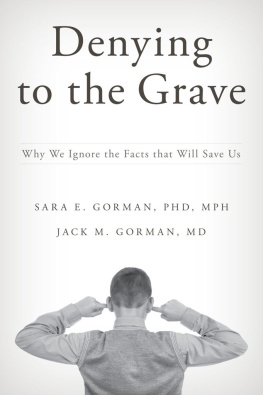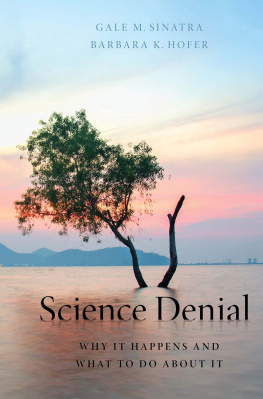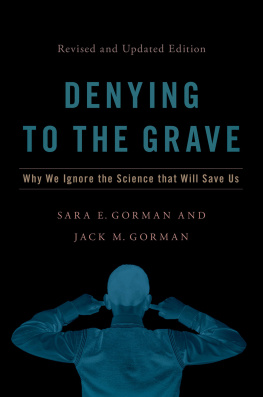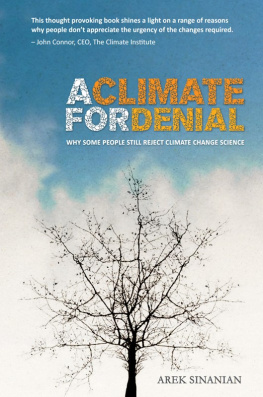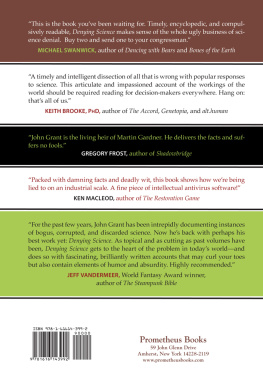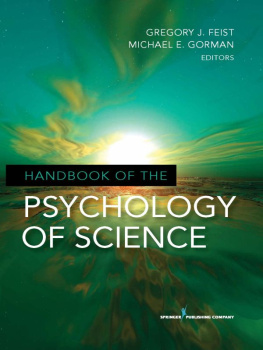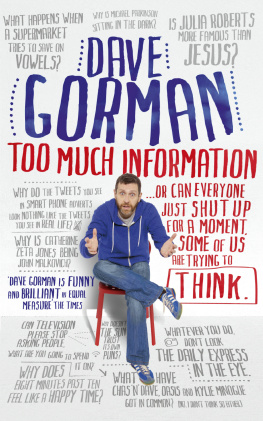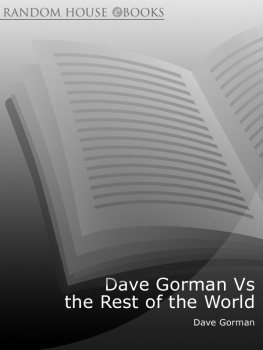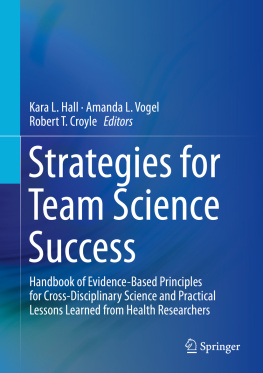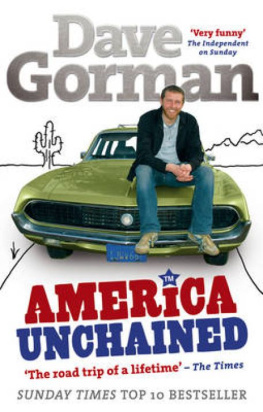Denying to the Grave
Denying to the Grave
Why We Ignore the Facts That Will Save Us
SARA E. GORMAN, PHD, MPH
JACK M. GORMAN, MD


Oxford University Press is a department of the University of Oxford. It furthers the Universitys objective of excellence in research, scholarship, and education by publishing worldwide. Oxford is a registered trade mark of Oxford University Press in the UK and certain other countries.
Published in the United States of America by Oxford University Press
198 Madison Avenue, New York, NY 10016, United States of America.
Oxford University Press 2017
All rights reserved. No part of this publication may be reproduced, stored in a retrieval system, or transmitted, in any form or by any means, without the prior permission in writing of Oxford University Press, or as expressly permitted by law, by license, or under terms agreed with the appropriate reproduction rights organization. Inquiries concerning reproduction outside the scope of the above should be sent to the Rights Department, Oxford University Press, at the address above.
You must not circulate this work in any other form and you must impose this same condition on any acquirer.
A copy of this books Cataloging-in-Publication Data is on file with the Library of Congress.
ISBN 9780199396603
eISBN 9780199396627
Authors Note
The information in this book is not intended to replace the advice of the readers own physician or other medical professional. You should consult a medical professional in matters relating to your health, especially if you have existing medical conditions, and before starting, stopping or changing the dose of any medication you are taking. Individual readers are solely responsible for their own health care decisions. The author and the publisher do not accept responsibility for any adverse effects individuals may claim to experience, whether directly or indirectly, from the information contained in this book.
In memory of Howard Kantor, tireless devotee of science and medicine, beloved father, grandfather, and husband
Contents
We would like to express our gratitude to all the wonderful, inspiring people who helped us write this book. First and foremost, we thank all of the brilliant scholars and medical and public health practitioners, without whose contributions to our growing body of knowledge about neuroscience, psychology, and health decision making this book would have been impossible to write. Wed like to thank in particular the following scholars, who all generously served as interlocutors at some stage during the writing of this book: Daniel Kahneman, Michael Shermer, Seth Mnookin, Tal Gross, and Nicoli Nattrass. We are very grateful to the anonymous reviewers of the book whose input was critical in shaping and improving our final product. We are indebted to the wonderful people at Oxford University Press, including Andrea Zekus, who helped us along this sometimes arduous process, and of course, our fantastic editor, Sarah Harrington, whose sharp insight was always much appreciated.
Sara would also like to thank her colleagues and mentors at work for allowing her the time and flexibility to work on the book and for supporting and encouraging her along the way. Shes also extremely grateful to Wendy Olesker for all her support.
Many people provided intellectual and emotional support to Jack that was indispensable in writing this book, and he is especially grateful to Robert Wainwright, Richard Munich, Catherine DiDesidero, Bruce Brady, Rabbi Avi Weiss, Alexandra Roth-Kahn, Stan Arkow, Marc Suvall, Carol Clayton, Leigh Steiner, and David Bressman for their creative ideas and friendship.
Finally, there are many amazing people in our personal lives who have offered us critical support as we undertook this journey. Because we are father and daughter, we have most of them in common. We are deeply grateful to Rachel Moster, Saras sister and Jacks daughter, and David Moster, Rachels husband, for being our all-time champions, for always being there for us, and for always sharing our excitement with their overwhelming warmth, intellectual prowess, and zest.
Two people are the bedrock and inspiration for all we do. Lauren Kantor Gorman, Saras mother and Jacks wife, is the beacon of light in the madness that sometimes comes from writing a book. As a brilliant psychiatrist, she has wonderful insights into the emotional basis for peoples choices and decisions that helped us enormously in focusing our own ideas. We thank her for always being so steady, reliable, and smart, and for showering us with her constant love and warmth. Last but by no means least, wed like to thank Robert Kohen, Saras husband and Jacks son-in-law. Robert is our brilliant interlocutor, our intellectual companion, and our unending inspiration. Thank you for being you.
Denying to the Grave
It turns out that Thomas Duncan was not the only person who died in the United States on October 8, 2014. If we extrapolate from national annual figures, we can say that on that day almost 7,000 people died in the United States. About half of them died of either heart disease or cancer; 331 from accidents, of which automobile accidents are the most common; and 105 by suicide. The chance of being killed in a car crash is about 1,500 times greater than the risk of getting infected with the Ebola virus in the United States.
It probably comes as no surprise that there were very few front-page headlines about bee stings or shark attacks on October 8, 2014, let alone about car crashes and gun violence. Perhaps this seems natural. After all, Ebola virus infection, the cause of Ebola hemorrhagic fever (EHF), is unusual in the United States, whereas heart attacks, cancer, car crashes, suicide, and murder happen on a regular basis. The problem, however, with the media emphasizing (and ordinary people fearing) Ebola over other far more prevalent health threats is that it shapes our behavior, sometimes in dangerous ways. How many people smoked a cigarette or consumed a sugary breakfast cereal while reading about the threat they faced in catching Ebola?
Some Americans jumped on the blame game bandwagon, attacking the CDC, insisting that politicians and hospitals had dropped the ball, and accusing African countries of ignorant, superstitious behavior. In Washington, DC, one-quarter of the members of Trinity Episcopal Church stopped attending services because they feared that some fellow parishioners might have traveled to West Africa.
Fear of Ebola gripped the country after Dr. Craig Spencer was diagnosed with Ebola and was admitted to New York Citys Bellevue Hospital.interests, and of stupidity. The data may be clear about who is right and who is wrong, but people make decisions that ignore or deny the evidence. This book is an attempt to elucidate why we do this and what we can do to make better decisions about our health and the health of our loved ones.
Why Do We Ignore or Deny Scientific Evidence?
It turns out that there are many reasons for refusing to acknowledge scientific evidence when making health decisions, but stupidity is not one of them. Very smart people take positions that are not remotely based on evidence. There is a direct relationship, for example, between intelligence and refusing to vaccinate a child: this unfortunate behavior is championed mainly by very well-educated and affluent people. What then causes smart people to make decisions and adopt positions that have no factual basis? That is the question with which this book wrestles.

